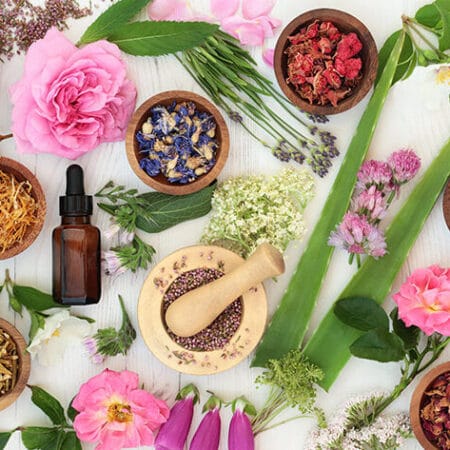What is Bach Flower Therapy?

Bach Flower Therapy is a natural method of healing discovered by an English surgeon, bacteriologist and homeopath Dr. Edward Bach, during the early 1930s. It is a simple system of healing prepared from the wild plants, flowers and trees found in the countryside of UK.
As Dr. Bach recognised and medical science now acknowledges, our physical health is influenced by our emotions. This alternative medicine system gently restores the balance between mind and body by casting out negative emotions such as fear, worry, anger, hatred, jealously, self doubt and indecision, sadness, impatience and guilt, which interfere with our equilibrium. These negative feelings or psychological “toxins” and stress are believed to weaken our immune response. But if these negtive feelings are harmonized, the immune sysytem will be strengthened and can deal with the incoming pathogens.
This system allows us to combine various flower essences to match our personality, negative behaviour pattern and feelings. Their special healing qualities have no side effects and are non-addictive and after the intake of just a few drops of these remedies you feel that conflict has given way to inner harmony.
Dr. Bach’s simple system of healing is being used by hundreds of thousands of people in countries around the globe. There is hardly a person, animal or situation that would not benefit from the flower remedies. These remedies can help you and your friends and family to stay well- balanced and healthy.
Benefits of Bach Flower Therapy
- Aspen — for fear and anxiety of an unknown origin.
- Agrimony — for inner suffering and anguish hidden by a smiling or brave face.
- Beech — for a critical attitude and for intolerance of shortcomings in others. The remedy helps us to become tolerant and understanding.
- Centaury — for those who do not know how to say “No”
- Cerato — for those who are not confident in their assessment or decision
- Cherry Plum — for loss of self-control and for fear they could hurt themselves or others.
- Chestnut Bud — unable to learn from past experiences and mistakes. The remedy helps you to understand and remember where you have been repeatedly going wrong.
- Chicory — for those who like to be appreciated by the family for their efforts and may feel hurt if they don’t. The remedy may help them to be less possessive, controlling and manipulative.
- Clematis — for day dreamers who are disinterested in the present. The remedy revives their interest in the present.
- Crab Apple — for those who fear infection and are dissatisfied with their appearance. They may be obsessed with order and cleanliness. It’s a cleansing remedy.
- Elm — for an acute crisis of confidence, when overwhelmed by additional duties or responsibility.
- Gentian — for discouragement and despondency after failure.
- Gorse — for hopelessness and pessimism
- Heather — for people obsessed with themselves, chatterboxes, self-centered.
- Holly — for anger and spite caused by hatred, jealousy and suspicion.
- Honeysuckle — for those who live in the past, nostalgia, homesickness.
- Impatiens — for impatience and irritation.
- Larch — for lack of self-confidence and inferiority complex
- Mimulus — for every day, common fears and anxieties, when a person knows what they are afraid of, also for shyness and timidity.
- Mustard — for sudden depression and dark moods, with no apparent reason.
- Oak — for those who are plodders- optimistic, strong and struggling to overcome the limits of their strength.
- Olive — for physical & mental exhaustion after exertion or after a long day.
- Pine — for self-blame & guilt.
- Red Chestnut — for anxiety, fear and worry for the safety and wellbeing of a loved one.
- Rock Rose — for terror and extreme fear. May help in panic attacks.
- Rock Water — for excessive self-control and self-discipline.
- Scleranthus — for the inability to choose between 2 options. For indecision.
- Star of Bethlehem — for shock, grief or trauma.
- Sweet Chestnut — for “a broken heart “, anguish, despair, when there is no way out.
- Vervain — for over enthusiasm.
- Vine — for dominant people who tend to rule others with an “iron fist “
- Walnut —to help adapt to change and to protect oneself from outside influences.
- Water Violet — for withdrawn, on interfering, self-sufficient people who may seem proud.
- White Chestnut — for unwanted repetitive thoughts
- Wild Oat —to help decide when one is clueless about his/her career options.
- Wild Rose — for apathy and resignation
- Willow — for bitterness, blaming others, resentment, envy and self-pity
- 5 Flower Remedy/ Rescue Remedy — Emergency Formula for acute stress.

